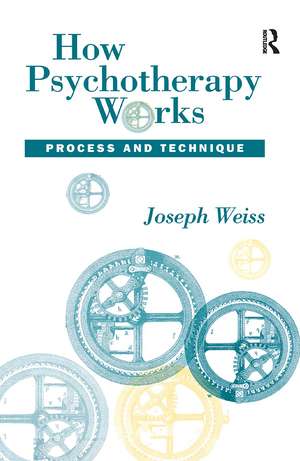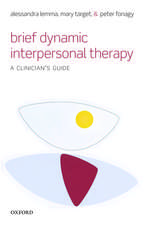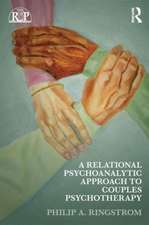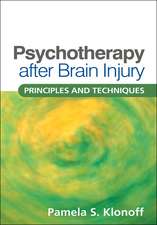How Psychotherapy Works: Process and Technique
Autor Joseph Weissen Limba Engleză Hardback – 18 noi 1993
Preț: 318.96 lei
Preț vechi: 335.75 lei
-5% Nou
61.03€ • 63.95$ • 50.45£
Carte tipărită la comandă
Livrare economică 12-26 aprilie
Specificații
ISBN-10: 0898625483
Pagini: 224
Ilustrații: illustrations
Dimensiuni: 152 x 229 x 25 mm
Greutate: 0.52 kg
Ediția:New.
Editura: Guilford Publications
Colecția Guilford Press
Public țintă
Professional Practice & DevelopmentCuprins
The Technique of Psychotherapy: Theory and Practice. Introduction. Affective Motivation and Adaption. The Therapist's Task. Inferring the Patient's Plan from the First Few Sessions of Therapy. Testing. Interpretation. The Therapist's Use of Dreams. Part II: Research and a Comparison of Theories. The Empirical Basis of the Theory. A Comparison of the Present Theory with Freud's 1911?1915 Theory and with His Late Theories. A Comparison of the Present Theory with Other Current Theories. Appendix: List of Case References. References. Index.
Notă biografică
Joseph Weiss is a training analyst at the San Francisco Psychoanalytic Institute, Clinical Professor of Psychiatry at the University of California Medical Center in San Francisco, and Co-director (with Harold Sampson) of the San Francisco Psychotherapy Research Group. He received his baccalaureate degree from Harvard, his medical degree from the University of Cincinnati Medical School, and was trained in psychoanalysis at the San Francisco Psychoanalytic Institute, where he became a training analyst in 1962. He is also currently in private practice in San Francisco.
Recenzii
This exciting and original book is a veritable treasure-house of practical understanding and clinical wisdom gained from Dr. Weiss's decades of psychoanalytic experience and amply supported by an impressive body of systematic research on the theories he has advanced. The lucidity and readability of this work is outstanding and should make this an excellent basic text for beginners in the field, as well as seasoned mental health practitioners.
According to Weiss's therapy, psychopathology stems from pathogenic beliefs formed mainly in childhood from traumatic relationships. Weiss's theory of therapy and technique follows directly from his concept of psychopathology. He views psychotherapy as a process in which the patient works to disconfirm his pathogenic beliefs with the help of the therapist. Patients are powerfully motivated to disconfirm these beliefs because they are maladaptive and grim, and they produce much mental pain. Weiss conceptualizes the therapist's basic task as being one of helping patients to disprove their pathogenic beliefs, particularly their unconscious pathogenic beliefs, and to help patients pursue the goals that have been blocked by these overwhelmingly disturbing ideas. --Theo. L. Dorpat, M.D., F.A.P.A., Seattle, Washington
In HOW PSYCHOTHERAPY WORKS, Joseph Weiss offers an experience-near, relational, and rational approach to psychoanalytic therapy that is based on empirical research into the therapeutic process. A breath of fresh air in a field dominated by unsupported doctrine, this excellent text will serve as an invaluable guide to all students of psychotherapy. --Robert D. Stolorow, Ph.D., Training and Supervising Analyst, Institute of Contemporary Psychoanalysis
....This highly original book is recommended reading for mental health professionals at all levels of training. --Theo L. Dorpat in The Psychoanalytic Quarterly
This book is recommended for educators and practitioners wanting to understand and make use of a psychoanalytic approach with clients. --David A. Jenkins, Ph.D., The American Journal of Family Therapy
This book summarizes decades of clinical teaching, research, and study in a form that is readily accessible to the working psychoanalyst....The body of work presented is important and should be taken seriously. --Stephen F. Bauer, M.D., in Psychoanalytic Books
This original and exciting book on psychotherapy process and technique should become, in a short time, the most outstanding book in the field of psychoanalytical technique and process....The readability of this eminently practical volume makes it required reading for mental health professionals at all levels of training and experience. --Theo L. Dorpat, M.D., in The Psychoanalytic Psychotherapy Review
"Patients come to psychotherapy hoping to get better and look to therapists to help them feel safe by disconfirming conscious pathogenic beliefs. Here we have what seems like a remarkably simple idea. But what is revolutionary and most startling, Weiss's theory has been empirically tested and validated. Weiss ranges from his broad conceptualization of motivation and pathogenesis to the microanalysis of the clinical exchange. He demonstrates the impact of psychotherapy is in the "effect" of interventions, not on the intent or "purity" of technique. Reading HOW PSYCHOTHERAPY WORKS is a corrective educational experience." --Joseph Lichtenberg, M.D., Washington, D.C. "This exciting and original book is a veritable treasure-house of practical understanding and clinical wisdom gained from Dr. Weiss's decades of psychoanalytic experience and amply supported by an impressive body of systematic research on the theories he has advanced. The lucidity and readability of this work is outstanding and should make this an excellent basic text for beginners in the field, as well as seasoned mental health practitioners. According to Weiss's therapy, psychopathology stems from pathogenic beliefs formed mainly in childhood from traumatic relationships. Weiss's theory of therapy and technique follows directly from his concept of psychopathology. He views psychotherapy as a process in which the patient works to disconfirm his pathogenic beliefs with the help of the therapist. Patients are powerfully motivated to disconfirm these beliefs because they are maladaptive and grim, and they produce much mental pain. Weiss conceptualizes the therapist's basic task as being one of helping patients to disprove their pathogenic beliefs, particularly their unconscious pathogenic beliefs, and to help patients pursue the goals that have been blocked by these overwhelmingly disturbing ideas." --Theo. L. Dorpat, M.D., F.A.P.A., Seattle, Washington "In HOW PSYCHOTHERAPY WORKS, Joseph
Descriere
In this volume, the author presents an enlightened theory of psychotherapy which has broad implications for the understanding of human behavior. His theory is distinctive in its emphasis on concepts that Freud developed in his late works concerning the patient's cognition and problem?solving activities to his power unconscious. The theory derives its clinical power from its empirical origin, closeness to observation, and from Weiss' cogent exposition of how to infer, from history and behavior, what the patient is trying to accomplish and how the therapist may help. Weiss develops the implications of his theory for technique and includes numerous clinical examples to illustrate concepts. This text is aimed at psychiatrists, psychologists, and clinicians in the field of mental health.










